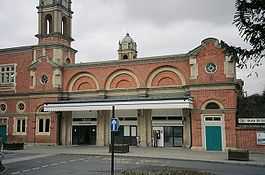Bury St Edmunds railway station
| Bury St Edmunds | |
|---|---|
|
The station entrance | |
| Location | |
| Place | Bury St Edmunds |
| Local authority | St Edmundsbury |
| Grid reference | TL852651 |
| Operations | |
| Station code | BSE |
| Managed by | Abellio Greater Anglia |
| Number of platforms | 2 |
| DfT category | C2 |
|
Live arrivals/departures, station information and onward connections from National Rail Enquiries | |
| Annual rail passenger usage* | |
| 2002/03 | 0.204 million |
| 2004/05 |
|
| 2005/06 |
|
| 2006/07 |
|
| 2007/08 |
|
| 2008/09 |
|
| 2009/10 |
|
| 2010/11 |
|
| 2011/12 |
|
| - Interchange | 225 |
| 2012/13 |
|
| - Interchange |
|
| 2013/14 |
|
| - Interchange |
|
| History | |
| Key dates | Opened 1847 |
| National Rail – UK railway stations | |
| * Annual estimated passenger usage based on sales of tickets in stated financial year(s) which end or originate at Bury St Edmunds from Office of Rail Regulation statistics. Methodology may vary year on year. | |
| UK Railways portal | |
Bury St Edmunds railway station serves the town of Bury St Edmunds in Suffolk, England. The station, and all trains calling there, are operated by Abellio Greater Anglia.
Historical services

According to the Official Handbook of Stations the following classes of traffic were being handled at this station in 1956: G (Goods), P (Passenger, Parcels & Miscellaneous), F (Furniture Vans, Carriages, Motor Cars, Portable Engines and Machines on Wheels), L (Livestock), H (Horse Boxes and Prize Cattle Vans) and C (Carriages and Motor Cars by Passenger or Parcels Train); there was a 9-ton crane. Private sidings were operated by British Sugar, Burlingham & Son, J Gough & Son, Ridley Coal & Iron and H A& D Taylor.[1]
Train services
The following services currently call at Bury St Edmunds:
| Operator | Route | Material | Frequency |
|---|---|---|---|
| Abellio Greater Anglia | Peterborough - Whittlesea - March - Manea - Ely - Bury St Edmunds - Stowmarket - Ipswich | Class 170 | Every 2 hours |
| Abellio Greater Anglia | Cambridge - Dullingham - Newmarket - Kennett - Bury St Edmunds - Thurston - Elmswell - Stowmarket - Needham Market - Ipswich | Class 170 | 1x per hour |
As of December 2010 services between London and Peterborough have been dropped.
| Preceding station | |
Following station | ||
|---|---|---|---|---|
| Abellio Greater Anglia Peterborough – Ipswich | ||||
| Terminus | Abellio Greater Anglia Bury St Edmunds – Ipswich | |||
| Abellio Greater Anglia | ||||
| Dutchflyer Cambridge-Amsterdam | ||||
| Historical railways | ||||
Line open, station closed | Great Eastern Railway | Line and station open |
||
| Disused railways | ||||
Line and station closed | Great Eastern Railway | Terminus | ||
Line and station closed | Great Eastern Railway Long Melford-Bury St Edmunds Branch | |||
Architecture and layout
Designed by Sancton Wood (the architect also of Ipswich and Cambridge railway stations as well as many stations in Ireland, the principal of which is Heuston Station, Dublin), the station was formally inaugurated in November 1847, eleven months after the opening of the Eastern Union Railway's line from Ipswich.
The most noteworthy feature of the station, which is constructed of red brick with stone dressings, is a pair of towers (originally linked by an overall roof, removed in 1893) on either side of the tracks at the eastern end of the layout. As first built – as a terminus – the station had four tracks, although in practice only one platform was used before the line was extended to Newmarket in 1854. Today a wide space separates the two surviving through tracks, which serve Platform 2 (for trains from Ipswich) and Platform 1 (called at by those heading east).[2][3]
The semi-elliptical brick arch bridge over Northgate Road to the east of the station, which like the station building is a Grade II listed building, has been credited to Frederick Barnes and Charles Russell.
Derailment
Due to the freight train derailment on a bridge near Ely in June 2007, trains to Peterborough from London (via Ipswich) were terminating at Bury St Edmunds while the bridge was rebuilt. Train services resumed on 21 December 2007.
References
- ↑ Official Handbook of Stations, British Transport Commission, 1956.
- ↑ Biddle, Gordon (2003). Britain's Historic Railway Buildings. Oxford University Press. ISBN 0-19-866247-5.
- ↑ "Bury St Edmunds, Suffolk". Great Eastern Journal (106): 23–9. April 2001.
External links
- Train times and station information for Bury St Edmunds railway station from National Rail
- Bury St Edmunds station on navigable 1946 O.S. map
